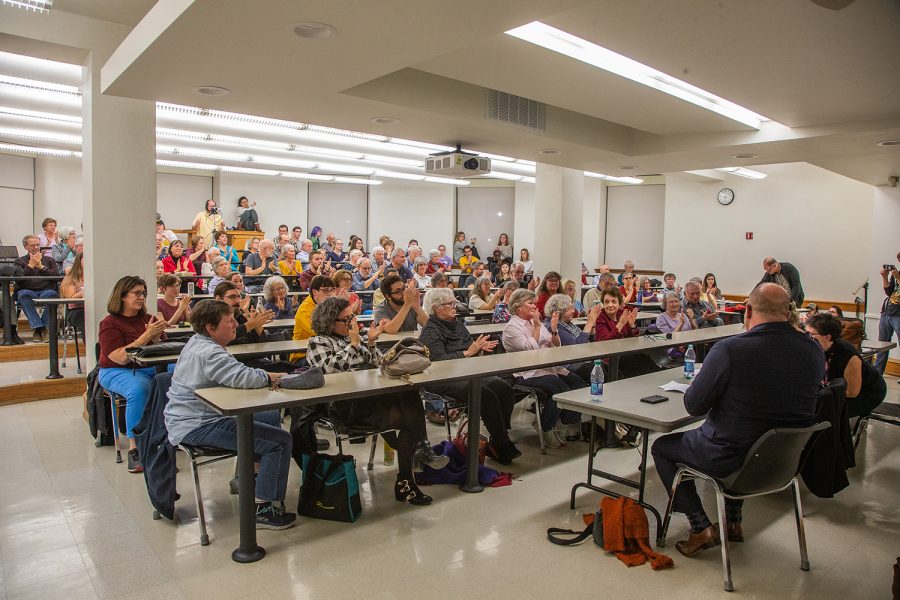UI hosts panel discussing anti-Semitism in wake of Pittsburgh shooting
The UI hosted a panel to allow people in the community to hear speakers and ask questions to better understand anti-Semitism.
The audience claps after Rabbi Esther Hugenholtz speaks at the “Understanding Antisemitism” panel on Thursday, Nov. 1, 2018. The panel discussed where anti-semitic rhetoric comes from in the Bible, and the history of using it to advance anti-Semitic views.
November 1, 2018
The room on Thursday night was filled with people young and old, all there for the same purpose — to hear about and better understand anti-Semitism.
In the aftermath of the shooting at the Tree of Life Synagogue in Pittsburgh, the University of Iowa History Department hosted a panel titled “Understanding Anti-Semitism.” The panel was led by Professor Robert Cargill of the Religious Studies and Classics Department, Professor Elizabeth Heineman of the History Department, and Rabbi Esther Hugenholtz of Congregation Agudas Achim.
The hall used for the panel was filled to standing room only. Audience members began spilling into other rooms where the lecture was live-streamed.
During the panel, Cargill discussed the religious roots of anti-Semitism and the discussion of it in the Bible; Heineman discussed the instances of anti-Semitism; and Hugenholtz discussed her experiences as a Jew in Europe and in the U.S.
In the lecture, Cargill stressed that Christianity was originally a sect of Judaism, and the conflict between the two was an internal Jewish dispute about different interpretations of religious traditions. When this dialogue in religious text is taken out of context, it is used to justify anti-Semitic actions, he said.
“It is from the New Testament itself that some Christians get their license to harm Jews,” Cargill said. “Jesus said it, the church fathers echoed it, the Reformation really drove it home. For a while there, this was considered to be the norm until places like the United States were established, a secular nation where you had the freedom to worship as you saw fit.”
Throughout history, Jewish people were considered to be responsible for the negative things that happened, whether it be political, economic, cultural, or racial issues, Heineman said. In the mind of Christians, she said, the Jews were responsible for the death of Jesus.
RELATED: ‘We do not tolerate hate or racism’: Community honors victims of Pittsburg, Louisville shooting
“Somehow, the Jews can be behind it all, because although they are a small minority, they can infiltrate,” Heineman said about historical ideas about the Jewish people.
According to the Anti-Defamation League’s 2017 Audit of Anti-Semitic Incidents, the number of incidents in Iowa increased from zero in 2016 to nine in 2017. Of the number of incidents recorded, five were harassment and four were vandalism.
The league reported that the number of overall anti-Semitic incidents in the U.S. in 2017 has increased since 2016. The total number of anti-Semitic incidents in 2017 was 1,986, a 56.7 percent increase over the 1,267 incidents in 2016.
Hugenholtz, originally from Amsterdam, moved to Iowa City to become the rabbi for Agudas Achim.
The Jewish population in Europe is 1.4 million; in the U.S., 4 million. The Jewish population in Europe never fully recovered from Shoah, the Jewish word for the Holocaust, she said.
The Jewish people are all responsible for each other and are a family, Hugenholtz said. Even though there has been violence toward the Jewish people, they will still keep welcoming people into Judaism, she said.
“I’m very happy to be here, and I’m also very devastated to be here for this reason,” Hugenholtz said. “This is not the America that I had envisioned going to, and I still hold out in my heart the hope for everything about the America that I love and respect and cherish.”






